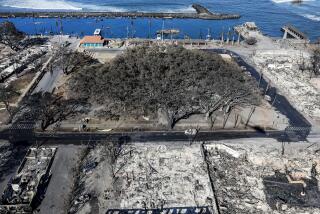Outgoing EU Chief Prodi Helped Bring Kadafi Inside the Fold
BRUSSELS — During his history-making and eyebrow-raising visit here this week, Libyan leader Col. Moammar Kadafi called Romano Prodi, the president of the European Commission, “my brother.”
But the bespectacled Italian professor who brought Kadafi to the capital of Europe couldn’t be less like the Libyan dictator. Kadafi is a swashbuckling showman who shook up this city with his colorful entourage and grandiloquent rhetoric in praise of violent “liberation movements” he sponsored when he was widely seen as a pariah.
In contrast, Prodi is a cerebral, amiable technocrat who managed to bring political calm and economic reform to Italy as prime minister in the 1990s. Prodi has had little occasion for bold moves during nearly five years at the helm of the massive polyglot bureaucracy of the European Union, a job that is all about compromise and nuance.
Long before President Bush and British Prime Minister Tony Blair decided to “rehabilitate” Kadafi late last year, however, Prodi began to reach out to the leader of Libya, a former Italian colony. As Prodi recalls wryly, he persisted after his attempt to invite Kadafi here during his first year in Brussels drew fire.
“The criticism was that, No. 1, it was a gaffe,” Prodi said during an interview this week. “And No. 2, that it was hopeless and premature. Now I feel that it was in the right direction, not premature. And it needed to be accompanied by concrete actions. This is what has been done. I think it is a contribution toward a more peaceful Mediterranean area.”
The Kadafi visit and the upcoming entry into the EU of 10 new member nations Saturday come in the final months of Prodi’s tenure. He will step down by October to lead Italy’s center-left opposition. The 64-year-old can take credit for speeding the rapprochement between the West and Kadafi, who now is seen as a potential partner against Islamic terrorism.
Prodi knows he will take heat too. His literal and figurative embrace of Kadafi, whose image for three decades has mixed elements of Saddam Hussein and Osama bin Laden, struck critics as too much too fast. In an editorial Tuesday, the French newspaper Le Figaro warned that EU leaders had given “the impression of renouncing their principles and neglecting their ideals,” reaffirming their reputation as aloof and autocratic.
Kadafi’s antics here may not have made life easier for Prodi. The Libyan interspersed his calls for peace with defiance, declaring in a radio interview before he left Brussels that he had no regrets about terrorist attacks in which Libyans killed hundreds.
“We have been accused of being terrorists, but that’s the price we have to pay,” Kadafi said on France’s RF1 network. “If that’s terrorism, we are proud to be terrorists because we aided the liberation of the [African] continent.”
Prodi prefers to focus on Kadafi’s recent actions: billion-dollar compensation of victims of terrorism and renunciation of Libya’s nuclear arms programs. Asked whether Kadafi’s repentance is genuine, Prodi said: “I am betting on it.... As Libya will open its economy and society, it will be much easier to test.”
Prodi seemed amused by Kadafi’s romp through this placid capital, responding with a cheerful Italian shrug to the eccentricities and the trampling of protocol. When Kadafi and Prodi met the media Tuesday, the Libyan’s bodyguards -- young, reportedly Cuban, women in flashy uniforms -- swarmed on stage to stand directly behind the leaders.
“I forgave him because they were so beautiful,” Prodi said, chuckling.
More to Read
Sign up for Essential California
The most important California stories and recommendations in your inbox every morning.
You may occasionally receive promotional content from the Los Angeles Times.










